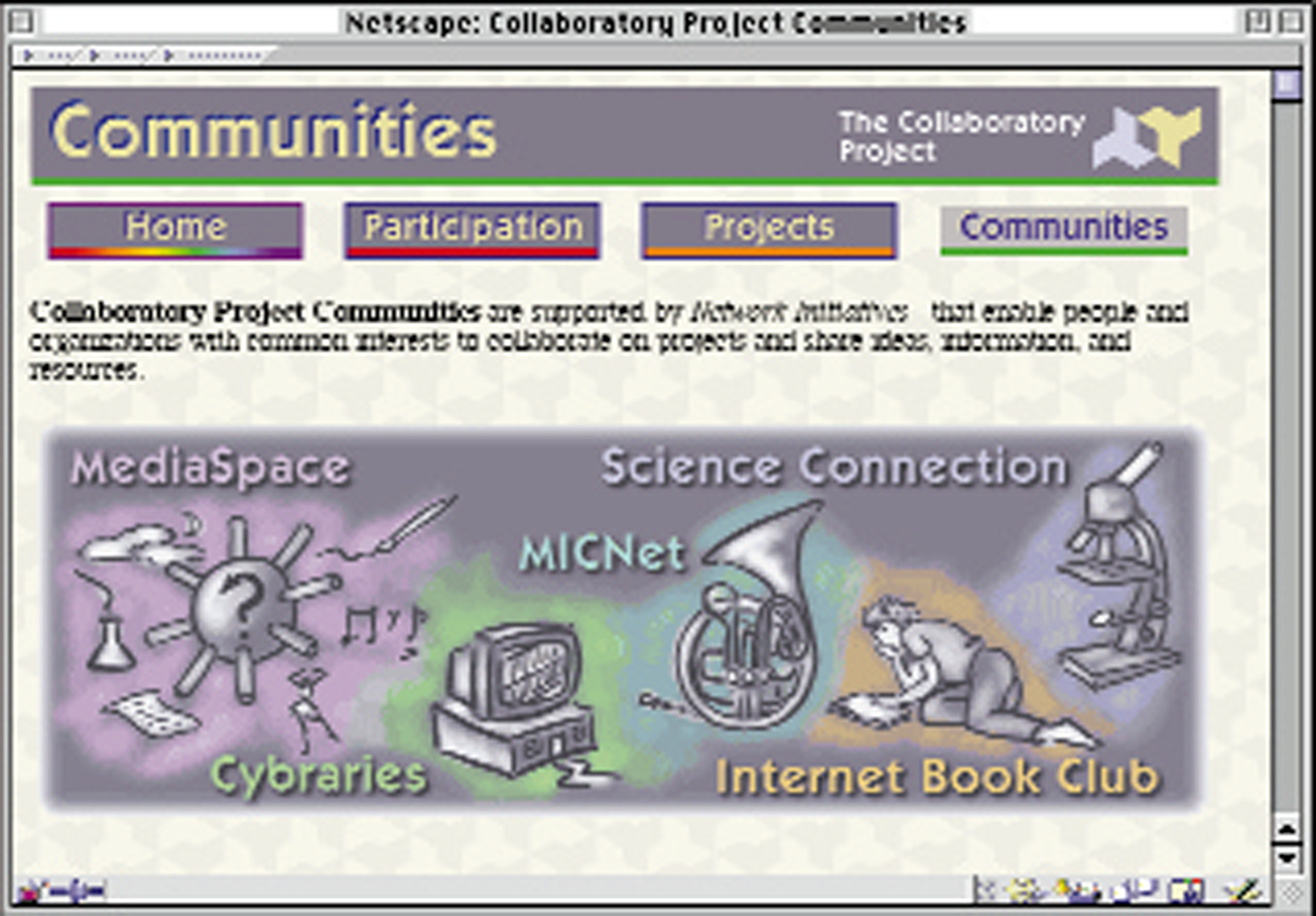“Supporting Online Collaborative Communities” by Hertz
Conference:
- SIGGRAPH 1999
-
More from SIGGRAPH 1999:


Type(s):
Title:
- Supporting Online Collaborative Communities
Program Title:
- Electronic Schoolhouse (Playground, Workshop)
Organizer(s)/Presenter(s):
Description:
This workshop demonstrates the Northwestern University Collaboratory Project’s MediaSpace and other collaborative environments, and provides participants with the chance to develop a multimedia “hub” in MediaSpace.
The Collaboratory Project (collaboratory.nunet.net/) is a Northwestern University initiative funded by a grant from the Ameritech Foundation. Its staff provides consulting, training, technical support, and information services to education, cultural, and nonprofit organizations interested in using network technologies to advance education.
The Project’s goal is to establish an easy-to-use, network-based collaborative environment that enables organizations in the greater Chicago region to work together to share information, resources, and expertise.
As part of the University’s Information Technology organization, the Collaboratory Project draws on the experience and technical expertise of the entire organization to support its mission. It works with individual educators, school project teams, and multi-school collaborations in the Chicago Public Schools system and surrounding school districts. In addition, the Collaboratory Project works with museums, libraries, and cultural institutions to develop innovative Web-based educational resources.
Within the project’s collaborative environment, various collaborative communities enable people and organizations with common interests to share projects, ideas, information, and resources. The communities are Web-based activities that participants can join as part of established curricular activities. They enable educators and students to share projects through dynamically created Web pages and discuss their ideas using Web-based discussion and chat resources. They also provide gateways to Internet resources and facilitate access to experts in the region.
An educator can join a collaborative community from the Collaboratory Project Web site and use it to meet specific curricular needs. Students can participate with anything from a single computer and a modem to a fully networked computer lab or school. Through a network connection, they submit text, graphics, sound, and video files from a standard Web browser to a database on a Collaboratory Project server. Educators can manage the content their students submit through other Web pages that provide password-protected access to the database. Web pages are created dynamically from the database.
Collaborative communities available on the Collaboratory Project Web site include:
Cybraries
A Cybrary (Cyber Library) enables educators and librarians to identify, organize, and share Internet resources that support curricular activities. Teachers, librarians, and students can review and contribute useful URLs to a shared virtual library or create
a new one to meet their own needs. The Collaboratory Project provides training on how to locate Internet resources, create online references, and prepare materials for network access and distribution as a Cybrary.
Internet Book Club
Designed for the K-12 curriculum, the Internet Book Club has four project areas where students and teachers can share language arts activities. Students can post book reviews, stories, essays, and original compositions and poems. Teachers can share project ideas and curricular materials in the Teachers Lounge. In particular, they can search participant databases to find other teachers who are using the same books and plan threaded discussions and online chat sessions for their students.
The Science Connection
The Science Connection brings together science activities and resources. Northwestern University scientists and engineers, who answer questions from teachers developing classroom science activities, support “Ask a Scientist.” Observation, data collection, and reporting projects that support scientific inquiry are being developed with Chicago museums. Teacher resources for science fair projects, reference materials, and more, are also available.
Music Internet Connections (MICNet)
MICNet is an Internet music collaboration project that supports school music teachers interested in exploring music composition activities with their students. Students can exchange music compositions in MIDI files and play and discuss those compositions from networked computers. Professional composers provide feedback to student composers.
MediaSpace
Media Space is a collaborative environment designed to encourage sharing of multimedia information, projects, and activities. Participants create “electronic multimedia postcards” using text, graphics, sound, and/or video files they have created.They can
contribute a project to an existing theme or start a new theme and invite others to participate. MediaSpace supports a number of projects, for example:
• Community-based research projects for schools along Interstate 57 in Illinois.
• Fairy tales written and illustrated by students around the world.
• Student explorations of their musical heritage.
• Reports on places students have visited.
• Documentation and discussion of a teacher’s visit to Swaziland, via a live link to an
Internet café in Swaziland.
• Creating and “documenting” imaginary cultures.
Educators can join an existing activity or start new MediaSpace projects from the Collaboratory Project Web site and use it to meet their particular needs, such as science reports, multimedia essays, history reports, personal journals, etc. MediaSpace emphasizes the use of images and sound in preference to text.
Within the Collaboratory Project’s shared environments, responsibility for content is distributed to educators and other interested parties while the server manages page layout, graphic design, and navigation using templates created by project staff. Each of the environments provides an easily extended and replicated model for networked collaboration. Because collaborative communities are participant-driven and used in projects that are closely tied to the curriculum, they provide fertile environments for developing innovative, collaborative projects and activities.




